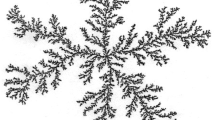Abstract
A probabilistic and counterfactual theory of causality is developed within the framework of branching time. The theory combines ideas developed by James Fetzer, Donald Nute, Patrick Suppes, Ming Xu, John Pollock, David Lewis and Mellor among others.
Similar content being viewed by others
REFERENCES
Armstrong, D. M.: 1997, A World of States of Affairs, CambridgeUniversity Press.
Belnap, N.: 1992, ‘Branching Space-Time', Synthese 92, 385–434.
Carlson, G. N. and F. J. Pelletier (eds.): 1995, The Generic Book, University of Chicago Press.
Cartwright, N.: 1979, ‘Causal Laws and Effective Strategies', Nôus 13, 319–437.
Conway, J. H.: 1976, On Numbers and Games, Academic Press, London, New York and San Francisco.
Davidson, D.: 1967, ‘Causal Relations', Journal of Philosophy 64, 691–703.
Davis, W. A.: 1988, ‘Probabilistic Theories of Causation', in J. A. Fetzer (ed.), Probability and Causality, D. Reidel, pp. 133–160.
Dowty, D.: 1979, Word Meaning and Montague Grammar, Reidel, Dordrecht.
Ducasse, C.: 1966, ‘“Cause” and “Condition”’, Journal of Philosophy 63, 238–241.
Eells, E.: 1991, Probabilistic Causality, Cambridge University Press.
Fetzer, J.: 1981, Scientific Knowledge, Reidel Publishing Company, Dordrecht.
Fetzer, J. and D. E. Nute: 1979, ‘Syntax, Semantics and Ontology: A Probabilistic Causal Calculus', Synthese 40, 453–495.
Fetzer, J. and D. E. Nute: 1980, ‘A Probabilistic Causal Calculus: Conflicting Conceptions', Synthese 241–246.
Giere, R.: 1980, ‘Causal Systems and Statistical Hypotheses', in L. J. Cohen and M. Hesse (eds.), Applications of Inductive Logic, Clarendon Press, pp. 251–270.
Gorovitz, S.: 1965, ‘Causal Judgments and Causal Explanations', Journal of Philosophy 62, 695–711.
Lewis, D.: 1986, ‘Postscript to Causation', in Philosophical Papers, Vol. 2, Oxford University Press, New York, pp. 172–213.
Lewis, D.: 2000, ‘Causation as Influence', Journal of Philosophy, 182–197.
Mackie, J.: 1974, The Cement of the Universe: A Study of Causation, Oxford University Press, Oxford.
Mackie, J. L.: 1975, ‘Causes and Conditions', in E. Sosa (ed.), Causation and Conditionals, Oxford University Press, pp. 15–38.
McCall, S.: 1994, A Model of the Universe: Space-Time, Probability, and Decision, Clarendon Press, Oxford.
McDermott, M.: 1995, ‘Redundant Causation', British Journal for Philosophy of Science 46, 523–544.
Meiland, J. W.: 1974, ‘A Two-Dimensional Passage Model of Time for Time Travel', Philosophical Studies 26, 153–173.
Mellor, D. H.: 1995, The Facts of Causation, Routledge.
Menzies, P.: 1989, ‘Probabilistic Causation and Causal Processes: A Critique of Lewis', Philosophy of Science 56, 642–663.
Mercier, C. A.: 1916, On Causation with a Chapter on Belief, Longmans, Green and Co.
Mill, J. S.: 1872, A System of Logic: Ratiocinative and Inductive, Longmans, Green, Reader and Dyer, eighth edition.
Nute, D.: 1981, ‘Causes, Laws and Law Statements', Synthese 48, 347–369.
Nute, D.: 1991, ‘Historical Necessity and Counterfactuals', Nôus pp. 161–175.
Otte, R.: 1981, 'A Critique of Suppes’ Theory of Probabilistic Causation', Synthese 48, 167–189.
Placek, T.: 2000, ‘Stochastic Outcomes in Branching Space-Time: Analysis of Bell's Theorem', British Journal for Philosophy of Science 445–475.
Pollock, J.: 1976, Subjunctive Reasoning, Reidel, Dordrecht.
Popper, K.: 1959, ‘The Propensity Interpretation of Probability', British Journal for the Philosophy of Science 10, 25–42.
Rosen, D. A.: 1978, ‘In Defense of a Probabilistic Theory of Causality', Philosophy of Science 45, 604–613.
Suppes, P.: 1970, A Probabilistic Theory of Causality,Vol. XXIV of Acta Philosophica Fennica, North-Holland Publishing Company, Amsterdam.
Thomason, R.: 1984 and 1986, ‘Combinations of Tense and modality', in D. Gabbay and F. Guenther (eds.), Handbook of Philosophical Logic, Reidel, Dordrecht, pp. 135–165.
van Fraassen, B. C.: 1981, ‘A Temporal Framework for Conditionals and Chance', in W. Harper (ed.), Ifs: Conditionals, Belief, Decision, Chance and Time, Reidel, Dordrecht, pp. 323–340.
von Kutschera, F.: 1993, ‘Causation', Journal of Philosophical Logic 22, 563–588.
von Kutschera, F.: 1997, ‘TxW-Completeness', Journal of Philosophical Logic 26, 241–250.
Xu, M.: 1997, ‘Causation in Branching Time (1): Transitions, Events and Causes', Synthese 112, 137–192.
Author information
Authors and Affiliations
Rights and permissions
About this article
Cite this article
Oksanen, M. Probabilistic Causation in Branching Time. Synthese 132, 89–117 (2002). https://doi.org/10.1023/A:1019622918223
Issue Date:
DOI: https://doi.org/10.1023/A:1019622918223




